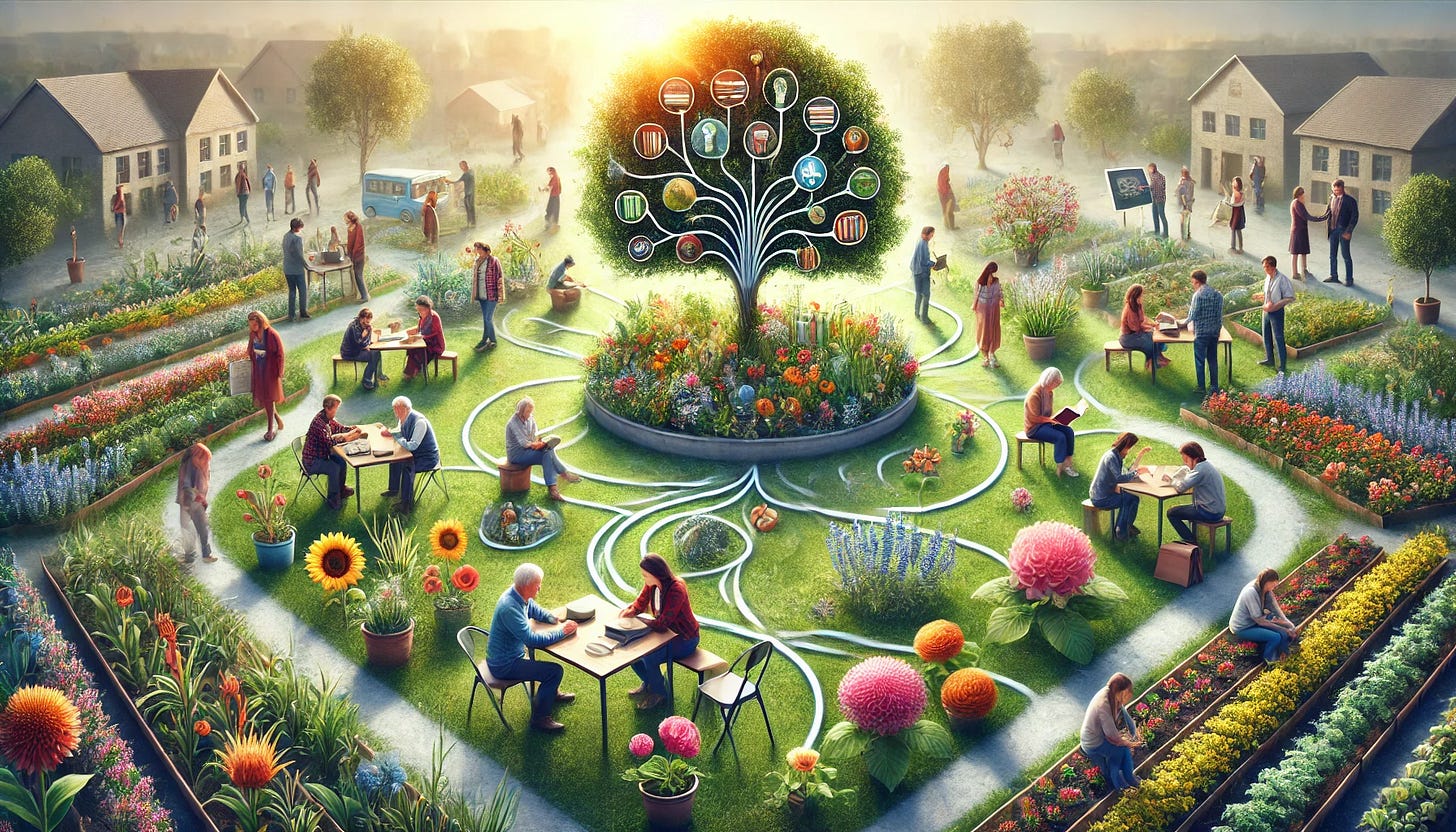Knowledge Gardening: Cultivating Collective Wisdom in the Commons
In today’s fragmented world, where resources—both intellectual and material—are often mismanaged or hoarded, the idea of commoning offers an alternative approach rooted in collective stewardship. At the core of commoning is the concept of "knowledge gardening," which treats knowledge as a community garden that must be cultivated, shared, and sustained through the active participation of its members. Just as a garden thrives through careful planting, tending, and harvesting, a knowledge commons grows and evolves through collaboration, ethical stewardship, and a commitment to the greater good. This essay explores how the metaphor of knowledge gardening reflects the principles of commoning, particularly through community engagement, relational governance, and a sustainable vision for the future.
1. Cultivating the Knowledge Garden: Participatory Learning
In a knowledge garden, learning is a participatory act. Unlike traditional education systems, which treat knowledge as a finite resource to be transmitted from teacher to student, knowledge gardening emphasizes that knowledge grows organically through shared experiences and dialogue. Community members act as both learners and gardeners, contributing insights, asking questions, and cross-pollinating ideas. The garden thrives because of this ongoing interaction.
As in a real garden, the knowledge garden requires care and attention. Information is not static but must be continuously tended through engagement and contribution. This learner-led approach fosters a sense of ownership, where individuals are motivated to contribute to the collective wisdom of the group. By recognizing that everyone has something valuable to offer, the knowledge garden becomes a fertile ground for innovation, diversity, and collective growth. Through this process, the community itself becomes a living, evolving repository of shared knowledge, shaped by its members' participation.
2. Nurturing Relationships: The Art of Commoning
The success of any knowledge garden depends not only on the ideas it contains but on the relationships between the gardeners themselves. The art of commoning involves nurturing these relationships by fostering trust, creativity, and mutual respect. Just as a healthy garden requires careful coordination between sunlight, water, and soil, the knowledge garden thrives when human relationships are grounded in collaboration and care.
Governance in a commons, like the tending of a garden, is decentralized and flexible. Instead of rigid rules or top-down authority, the art of commoning emphasizes light-touch governance, allowing communities to self-organize and respond to changing circumstances. This adaptability is key to ensuring that the garden remains vibrant, resilient, and capable of addressing emerging challenges. Trust between participants creates an environment where people feel empowered to take risks, share ideas, and innovate without fear of judgment. Through open communication and shared responsibility, the knowledge garden grows stronger and more inclusive.
Ethical stewardship is essential to this process. Commoning requires that participants recognize their responsibility to the community and to the resources they share. This includes not only managing the knowledge within the garden but also ensuring that it is used equitably and sustainably. The art of commoning, therefore, is about cultivating both intellectual and social resources, ensuring that the garden remains a space where all can flourish.
3. Sustaining the Garden: A Vision for the Commons
The vision of the commons is rooted in the idea that resources—whether they are knowledge, natural, or cultural—must be managed sustainably for the benefit of future generations. In a knowledge garden, this means creating systems that encourage the continuous regeneration of ideas and insights, rather than depleting them for short-term gain. Sustainability in the commons requires a long-term perspective, one that balances immediate needs with the responsibility to nurture the garden for those who come after.
In this vision, knowledge is not a commodity to be hoarded but a resource to be shared and cultivated for the collective good. A thriving knowledge garden fosters not only intellectual growth but also social cohesion, as it brings people together around common goals and shared responsibilities. The interconnectedness of community members within the knowledge garden mirrors the interconnectedness of ecosystems in nature. When the garden is cared for, it becomes a source of sustenance, not just for individuals but for the community as a whole.
The commons calls for a shift away from individualism and toward collective responsibility. By viewing knowledge as a shared resource that must be cultivated and tended together, the knowledge garden offers a framework for creating a more equitable and sustainable future. This vision challenges the dominant narratives of competition and consumption, replacing them with collaboration and care. It reminds us that, like a garden, knowledge flourishes when it is nurtured and shared, and that the health of the community depends on the collective efforts of its members.
Conclusion: The Garden as a Model for Collective Growth
Knowledge gardening offers a powerful metaphor for understanding the principles of commoning. It emphasizes that knowledge, like a garden, is a living system that requires ongoing care, attention, and collaboration. Through participatory learning, the art of commoning, and a vision of sustainable stewardship, the knowledge garden provides a model for how communities can grow together, sharing resources and responsibilities for the collective good. By embracing this approach, we can cultivate not only intellectual growth but also the social and ethical foundations needed to build resilient, thriving communities for the future.




